
FOREIGN LANGUAGE ANNALS
Scope & Guideline
Elevating Standards in Language Pedagogy
Introduction
Aims and Scopes
- Innovative Pedagogical Strategies:
The journal focuses on exploring and evaluating new teaching methodologies that enhance language acquisition, including technology integration, collaborative learning, and content-based instruction. - Cultural and Sociolinguistic Contexts:
Research published in the journal often examines the influence of cultural and sociolinguistic factors on language learning, addressing issues of identity, heritage languages, and the role of cultural representation in the curriculum. - Assessment and Evaluation Practices:
The journal emphasizes the importance of effective assessment methods in language education, including studies on language proficiency assessments, feedback mechanisms, and the impact of various instructional approaches on learner outcomes. - Learner-Centered Research:
A distinctive feature of the journal is its focus on learner perspectives and experiences, investigating motivation, anxiety, and self-regulation in language learning contexts. - Policy and Program Development:
The journal addresses educational policies and programmatic innovations, particularly those related to biliteracy initiatives and language education in diverse educational settings.
Trending and Emerging
- Technology-Enhanced Language Learning:
An increasing number of studies focus on the integration of technology in language learning, examining the effectiveness of online tools, apps, and digital resources in enhancing learner engagement and achievement. - Equity and Social Justice in Language Education:
Emerging discussions around equity and social justice have gained traction, with research exploring how language education can address issues of representation, access, and inclusivity for diverse student populations. - Heritage Language Education:
There is a growing emphasis on heritage language education, investigating the unique needs and motivations of heritage learners and the pedagogical strategies that best support their language development. - Intercultural Competence Development:
Research focused on developing intercultural competence among language learners is trending, highlighting the importance of cultural exchange and understanding in the language learning process. - Reflexivity and Teacher Identity:
Emerging themes around teacher reflexivity and identity in language teaching practices are becoming more prominent, encouraging educators to critically examine their roles and the impact of their backgrounds on their teaching.
Declining or Waning
- Traditional Grammar Instruction:
Research focused on traditional grammar instruction methods appears to be declining, as the field shifts towards more communicative and integrative approaches to language teaching. - General Language Acquisition Theories:
There has been a noticeable decrease in studies solely centered on broad theories of language acquisition, as more researchers emphasize specific contexts, learner experiences, and practical applications in pedagogy. - Static Assessment Models:
The focus on static assessment models that do not account for dynamic learning processes is waning, with a growing preference for formative assessment strategies that foster ongoing learner development. - Research on Monolingual Instruction:
There is a decline in research advocating for monolingual instruction, as the field increasingly recognizes the value of multilingual and multicultural perspectives in language education. - Cognitive Approaches to Language Learning:
Research emphasizing purely cognitive approaches to language learning, without consideration of sociocultural factors, is becoming less prevalent, as the interconnectedness of cognition and culture is more widely acknowledged.
Similar Journals

Language Testing in Asia
Pioneering innovative approaches to language assessment.Language Testing in Asia, published by SPRINGERNATURE, is a premier Open Access journal that has carved out a significant niche in the field of linguistics and language assessment. Established in 2011, this journal has rapidly ascended to the top quartile (Q1) in its category, showcasing its impact and relevance in the academic community, with impressive Scopus rankings that place it in the 92nd percentile of Arts and Humanities and 91st percentile in Social Sciences. With a commitment to disseminating high-quality research, the journal aims to provide a platform for innovative studies in language testing, evaluation, and assessment methodologies, particularly in the diverse context of Asia. Its open access policy since 2013 fosters widespread accessibility, ensuring that critical findings and insights reach a broader audience. By focusing on the intersections of language education, assessment practices, and cultural context, Language Testing in Asia is essential for researchers, educators, and policymakers dedicated to advancing the field of language testing.
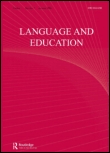
Language and Education
Shaping the Future of Language Acquisition and PedagogyLanguage and Education is a leading academic journal published by Routledge Journals, Taylor & Francis Ltd, specializing in the intersection of language studies and educational practices. With an impressive Q1 ranking in both Education and Linguistics and Language categories for 2023, it stands out as a crucial resource for researchers, educators, and industry professionals. Covering a wide array of topics pertinent to language acquisition, pedagogical methodologies, and culturally responsive education, this journal supports rigorous scholarship in the field. While not currently offering open access options, its contributions are vital for advancing knowledge and fostering innovation across disciplines. The journal's long-term commitment to excellence is evidenced by its high rankings in Scopus, placing it in the 94th percentile in Language and Linguistics and the 80th percentile in Education. Since its inception in 1987, Language and Education has not only tracked the evolving landscape of language education but has also actively shaped it, making it an indispensable tool for anyone invested in educational research and practice.

Journal of Technology and Chinese Language Teaching
Elevating Chinese Language Learning with Cutting-Edge ResearchJournal of Technology and Chinese Language Teaching, published by JOURNAL TECHNOLOGY & CHINESE LANGUAGE TEACHING, serves as an influential platform for scholars and practitioners in the intersecting fields of technology, language education, and linguistic research. With an ISSN of 1949-260X, this journal strives to disseminate cutting-edge research and innovative practices aimed at enhancing the teaching and learning of Chinese language through technological advancements. Operated from the United States, it currently occupies valuable quartiles within its categories, showcasing its significance—ranking Q4 in Computer Science Applications, Q3 in Education, and Q2 in Linguistics and Language. As it spans from 2019 to 2024, the journal provides a rich repository for international contributions, fostering a collaborative environment for educators, researchers, and students alike. With both Scopus and HIndex metrics reflecting a solid reputation, the Journal of Technology and Chinese Language Teaching is pivotal for those keen on pushing the boundaries of language instruction in the digital age.

Deutsch als Fremdsprache-Zeitschrift zur Theorie und Praxis des Faches Deutsch als Fremdsprache
Illuminating Pathways for German Language EducatorsDeutsch als Fremdsprache-Zeitschrift zur Theorie und Praxis des Faches Deutsch als Fremdsprache is a prominent academic journal published by ERICH SCHMIDT VERLAG in Germany, focused on advancing the field of German as a foreign language. With an ISSN of 0011-9741 and E-ISSN of 2198-2430, this journal has carved out a significant niche in linguistics and language education, reflecting its robust academic rigor as indicated by its ranking in the Q2 in Linguistics and Language and Q3 in Education quartiles for 2023. It occupies an important role in disseminating research, practical methodologies, and theoretical insights that contribute to the improvement of German language instruction globally. While it is not an open-access journal, its influence is bolstered by comprehensive reviews and scholarly contributions that are essential for researchers, educators, and students alike. With a history of converged years from 2013 to 2024, this journal remains a vital resource for those interested in the theoretical and practical aspects of teaching and learning German.

Journal of Asia TEFL
Illuminating the Future of English Teaching in AsiaWelcome to the Journal of Asia TEFL, a leading peer-reviewed platform dedicated to exploring the intersections of English language education, linguistics, and the dynamic educational landscapes of Asian contexts. Published by ASIA TEFL in South Korea, this journal has emerged as a pivotal resource for academia since its inception in 2004, with consistently expanding influence reflected in its Scopus rankings, including a notable 76th percentile in Linguistics and Language. With a focus on the evolving methodologies and pedagogical innovations in English language teaching, the journal aims to foster scholarly discussions that enhance teaching practices and policy-making in a globalized world. Although it currently operates without open access, its rigor and relevance in categories such as Education and Linguistics ensure that it remains a valuable asset for researchers, educators, and students seeking to advance their knowledge and practice within this vital field of study.
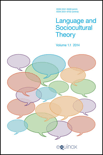
Language and Sociocultural Theory
Connecting Cultures through Language ScholarshipLanguage and Sociocultural Theory, published by EQUINOX PUBLISHING LTD, stands as a vital resource for scholars in the domains of linguistic studies and cultural theory. With its ISSN 2051-9699 and E-ISSN 2051-9702, this UK-based journal has consistently achieved Q1 rankings in both Cultural Studies and Linguistics and Language as of 2023, demonstrating its significant impact within the academic community. The journal's position is further affirmed by its rankings in Scopus, where it occupies the 80th percentile in Cultural Studies and the 72nd percentile in Linguistics and Language, making it a leading platform for cutting-edge research. Though not an Open Access journal, it provides critical insights into the interconnectedness of language and sociocultural dynamics, making it essential reading for researchers, professionals, and students eager to explore the complexities of human communication. Spanning converged years from 2014 to 2023, the journal presents a rich collection of scholarly articles that strive to advance the field and inspire further academic inquiry.
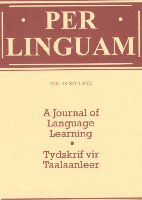
Per Linguam-A Journal of Language Learning
Transforming Language Education, One Article at a TimePer Linguam - A Journal of Language Learning, published by the University of Stellenbosch's Department Didaktiek, is a distinguished open-access journal that has been a vital resource for language educators and researchers since 1985. With an ISSN of 0259-2312 and an E-ISSN of 2224-0012, it fosters scholarly dialogue surrounding language acquisition and pedagogy. Positioned in the Q4 category in Developmental and Educational Psychology and Education, and Q3 in Linguistics and Language for 2023, this journal addresses crucial aspects of language learning that impact both teaching practices and learner outcomes. Although its Scopus rankings reveal challenges, the journal remains committed to its objectives of advancing knowledge and innovation in language education. Operating from Matieland, South Africa, Per Linguam invites contributions that explore the intersections of theory, research, and practical application, offering a platform for educators, students, and policymakers to share insights and strategies that can transform language learning experiences globally.
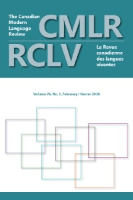
CANADIAN MODERN LANGUAGE REVIEW-REVUE CANADIENNE DES LANGUES VIVANTES
Cultivating a Community of Language Scholars and EducatorsCanadian Modern Language Review - Revue Canadienne des Langues Vivantes is a leading scholarly journal published by University of Toronto Press Inc, focused on the field of linguistics and language education. With its ISBN 0008-4506 and E-ISBN 1710-1131, this journal has established itself as a significant contributor to research in both the education and linguistics categories, currently holding a Q3 classification in Education and a Q2 in Linguistics and Language as of 2023. It boasts an impressive Scopus rank within the top percentiles for both fields, ensuring its validity and relevance among contemporary academic discourse. The journal's emphasis on publishing high-quality research aims to advance understanding and promote effective pedagogical practices, making it an essential resource for researchers, educators, and students passionate about modern languages. The Canadian Modern Language Review has been active from 1996 to 2024, facilitating discussions that bridge linguistic theory and educational practices, although it maintains a subscription-based access approach. Situated in Toronto, Canada, at the Journals Division, 5201 Dufferin St, Downsview, ON M3H 5T8, this journal invites contributions that explore innovative methodologies and critical issues in the field, fostering an environment of academic rigor and collaboration.
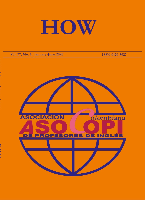
How-A Colombian Journal for Teachers of English
Empowering Educators, Transforming English Teaching.How: A Colombian Journal for Teachers of English is a prestigious, peer-reviewed publication dedicated to advancing the field of English language teaching in Colombia and beyond. Established by the ASOC COLOMBIANA PROFESORES INGLES, this journal has embraced an Open Access model since 2014, ensuring that innovative research and teaching methodologies are accessible to a global audience. With a focus on pedagogical strategies, curriculum development, and language acquisition, How aims to foster community among educators, researchers, and practitioners dedicated to improving English language instruction. The journal's commitment to high-quality scholarship and practical applications makes it an indispensable resource for professionals seeking to enhance their teaching practices. Housed in Bogotá, Colombia, How reflects the dynamic landscape of English education in Latin America, contributing significantly to both regional and international discourse.

Porta Linguarum
Fostering dialogue in the dynamic world of linguistics.Porta Linguarum, published by UNIV GRANADA in Spain, is a pioneering journal dedicated to the fields of linguistics and language studies, with a dual focus on the educational implications and applications within these disciplines. Launched in 2008 and continuing its impactful contributions into 2024, the journal is recognized for its rigorous peer-reviewed articles that address contemporary language issues, pedagogical approaches, and linguistic research, evidenced by its notable rankings in the 2023 Scopus metrics. Porta Linguarum holds a distinguished Q1 classification in Linguistics and Language, alongside a respectable Q3 placement in Education, marking it as a valuable resource for academics and practitioners alike. With an impressive ranking of 231 out of 1088 in the Arts and Humanities category and a strong 78th percentile ranking for Language and Linguistics, this journal facilitates the exchange of innovative ideas and promotes scholarly discourse. Although currently not adopting an open access model, it remains an essential platform for advancing knowledge in linguistics and education.